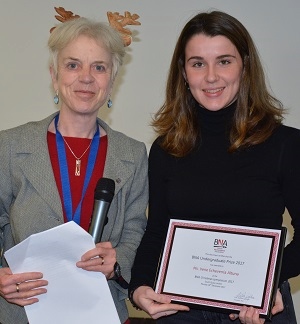BNA Annual General Meeting 2025
1st April 2025
Here you will find a curated list of free online resources to help you teach neuroscience concepts in the classroom or revise at home. Furthermore, these resources are linked to specific points on your Biology syllabus to assist you in pinpointing exactly where they fit in.
To begin, why not download our explanatory flyer today? Or just scroll down to access the resources straight away! If you have any feedback or questions, please don't hesitate to email office@bna.org.uk.
Step 1: Download the syllabus you are teaching or studying (please note, the syllabuses used are from 2015)
(click on hyperlinked PDFs below)
| AQA | Cambridge IGSCE | CCEA | Edexcel (Bio A) | Edexcel (Bio B) | OCR (Bio A) | OCR (Bio B) | Eduqas | WJEC | SQA | |
| GCSE | ||||||||||
| A-Level | ||||||||||
| National 5 | ||||||||||
| Higher | ||||||||||
| Higher Human | ||||||||||
| Advanced Higher |
Step 2: Find the specific learning objective from the syllabus

Step 3: Follow the table to see where it fits into the neuroscience Core Concepts

Step 4: Click on the learning objective to link to online neuroscience resources

How were these resources developed?
In 2007, the Society for Neuroscience (SfN), with consultation from hundreds of neuroscientists and educators across the US, created the Neuroscience 'Core Concepts': 8 fundamental principles that one should know about the brain and nervous system. In 2017, The British Neuroscience Association (BNA) mapped these 8 Core Concepts onto every Biology syllabus in the UK, including GCSE, A-Level, National 5s, Highers, and Advanced Highers. Therefore, teachers and educators can now explore where neuroscience-related syllabus content fits into these fundamental principles. Supporting these mappings, the BNA has curated a list of useful, relevant and free resources to aid in teaching this material.
(If you would like to find out more about the 8 'Core Concepts' themselves, please click here.)
As well as initially developing the 8 'Core Concepts' of Neuroscience, the Society for Neuroscience (SfN) provided many of the animations, videos, images, and explanations that are part of our UK curriculum-based resources. Their newly-refurbished brainfacts.org website contains these and many additional resources, including...
...the all-new interactive 3D brain model! Flip and rotate the brain to explore the different regions and bring a new interactive element to your teaching.
 Why not join us?
Why not join us?To stay updated with the latest neuroscience news and events, sign up as a member. Additionally, we welcome student members from the age of 16 for the price of £1 per month. See bna.org.uk/about/membership for details.
The UK adaptation of the neuroscience Core Concepts was made possible through collaboration between the British Neuroscience Association (BNA) and the Society for the Neuroscience (SfN). This project was kindly funded by Wellcome.
With special thanks to the UK working group - Narender Ramnani (Project Lead), Anne Cooke, Alex Collcutt, Mark Ungless, Jane Haley, Richard Wingate, Mark Souter, Megumi Sano.
 |
 |
 |